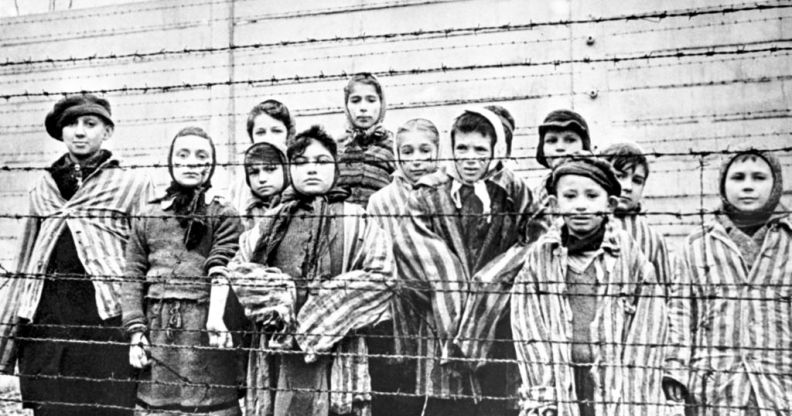Daughter of Holocaust survivor sues historian over claim her dead mother had a lesbian relationship with a Nazi guard

A group of child survivors behind a barbed wire fence at the Nazi concentration camp at Auschwitz-Birkenau in southern Poland, on the day of the camp’s liberation by the Red Army, 27th January 1945. (Captain Alexander Vorontsov/Getty)
The daughter of a deceased Holocaust survivor has begun a legal battle with a researcher who claimed that her mother had a lesbian relationship with a Nazi guard.
Dr Anna Hájková, associate professor of modern continental European history at University of Warwick, is researching the queer history of the Holocaust.
The Jewish Czech academic, also the descendent of a Holocaust survivor, said that her research “shows a more complex, more human, and more real society beyond monsters and saints”.
According to The Guardian, earlier this year a German court ruled that Hájková had violated the Holocaust survivor’s postmortem personality rights by insisting that she had had a sexual lesbian relationship with an SS guard while imprisoned in a concentration camp. In Germany, under the constitution a person’s reputation is protected even after their death.
The Jewish woman passed away 10 years ago, and her daughter’s lawyer told the Frankfurt regional court that she had met the Nazi guard at a Hamburg concentration camp.
The guard reportedly fell in love with the woman, and hoped for them to have a future together when the war was over. She was moved to two other concentration camps and was followed by the guard.
When the final camp, Bergen-Belsen, was liberated in 1945, the Nazi guard was arrested after trying to hide among the prisoners.
The daughter was contacted by Hájková in 2014, and she told the researcher that her mother’s relationship with the guard was never sexual, but that she had used the Nazi’s feelings for her to help her survive.
She said: “Me and my sister both knew that she got special favours and that the guard liked her. But it wasn’t physical.
“She said specifically she was never sexually or physically abused.
“I think she got away with a lot because she was charming, beautiful and a bit cheeky.
“She said to the woman who was doing the number [tattoo] on her arm, ‘Do you mind making it a bit smaller so it looks OK with my evening dress?'”
At the time, Hájková promised the daughter that she would not use her mother’s full name in her research.
But in 2019, in promotional material for lectures in Germany and Austria, the research named both the guard and prisoner in full, and stated that they had had a lesbian relationship. She later claimed that she “simply forgot” her promise not to name the woman.
She even posted a photo of the Holocaust survivor on Twitter, and wrote that “the inmates of the … women’s satellite camp observed the relationship between the guard and the prisoner woman with fascination and loathing”.
The daughter told the court that Hájková’s claims could destroy her mother’s “lifetime image and achievements”, and ultimately won her case.
The court ruled that the researcher could no long claim that the Holocaust survivor engaged in a relationship, sexual or otherwise, with the guard, and that she could not use her name or photos.
The daughter of the Holocaust survivor is now taking the researcher to court again.
Now, the daughter is taking Anna Hájková to court again for €25,000 (about £23,800) over five alleged breaches of the previous court ruling.
Hájková denies the allegations, and a new court case in underway.
The daughter also complained to the University of Warwick, and an investigation has started there into whether the academic fell short of ethical research standards.
Although the university is already requiring Hájková to undergo training on the university’s research code of practice, the daughter wants a harsher punishment.
She said: “I want the university to take stronger disciplinary action against her and to pay compensation for the extreme distress caused to me. I’ve told the [inquiry] panel I have been hysterically crying. I need this resolved so desperately.”

